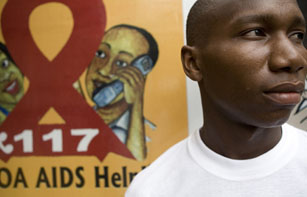
Feature Story
Innovative project in Tanzania places young people at the centre of HIV responses
06 April 2011
06 April 2011 06 April 2011
The Tanzania Youth Alliance (TAYOA) is a national, non-profit organization that empowers young people to engage in meaningful activities that improve their quality of life.
Credit: UNAIDS/AFP - Siegfried Modola
During a visit to the Tanzanian Youth Alliance (TAYOA), a national non-profit organization based in Dar Es Salaam, UN Deputy Secretary-General Dr Asha-Rose Migiro and UNAIDS Executive Director Michel Sidibé praised the young people for the extraordinary responsibility they have shown in addressing HIV.
TAYOA operates a National AIDS Helpline to respond to queries from young people on a range of HIV-related issues. Individuals call the Helpline free of charge using a landline or mobile phone. Medical students volunteer their time to counsel other youth across the country.
Starting with single phone line in 2001, the organization now runs eight lines for 12 hours a day. One thousand callers, on average, are counselled daily, and one million callers have been reached since 2008. Information is provided confidentially.
“Young people like you don’t want to sit around and be passive beneficiaries of programmes—they want to be dynamic agents of change!” said Mr Sidibé, addressing an audience of more than 200 youth at TAYOA headquarters. “What you are doing here to create space for young people is truly inspirational,” he added.
TAYOA’s National Helpline is the result of a unique public-private partnership between the Government of Tanzania, the United States Centers for Disease Control and six national phone operators: TiGO, Vodacom, Airtel, TTCL, Sastel and Zantel.
Young people like you don’t want to sit around and be passive beneficiaries of programmes, they want to be dynamic agents of change!
UNAIDS Executive Director Michel Sidibé
“In an era of real-time communications, this kind of strategic partnership is the lifeblood of effective HIV responses,” said the UN Deputy Secretary-General, after touring the TAYOA grounds. “I salute the young people who are working on this impressive project,” she added.
According to TAYOA staff, callers ask a range of questions around condom use, sexual relationships, HIV testing, antiretroviral treatment and the prevention of HIV transmission from mother to child. More than 200 young people support the National AIDS Helpline and other TAYOA programmes, including youth outreach clubs and an information technology project.
“One of the great lessons we have learned in our journey is the need to embrace and cultivate a culture of volunteerism in our society,” said Peter Masika, Country Director for TAYOA. “We have learned that when young people are meaningfully engaged, they can take charge and act to improve their own quality of life, and the lives of their friends.”
Over the past decade, young people in Tanzania appear to have adopted safer sexual behaviours: according to a UNAIDS study, HIV prevalence among Tanzanian youth aged 15 to 24 fell by more than 25% between 2001 and 2009.



